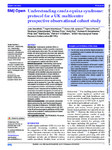Understanding cauda equina syndrome: protocol for a UK multicentre prospective observational cohort study
| dc.contributor.author | Woodfield, J | |
| dc.contributor.author | Hoeritzauer, I | |
| dc.contributor.author | Jamjoom, AAB | |
| dc.contributor.author | Pronin, S | |
| dc.contributor.author | Srikandarajah, N | |
| dc.contributor.author | Poon, M | |
| dc.contributor.author | Roy, Holly | |
| dc.contributor.author | Demetriades, AK | |
| dc.contributor.author | Sell, P | |
| dc.contributor.author | Eames, N | |
| dc.contributor.author | Statham, PFX | |
| dc.date.accessioned | 2021-12-02T10:49:32Z | |
| dc.date.available | 2021-12-02T10:49:32Z | |
| dc.date.issued | 2018-12-14 | |
| dc.identifier.issn | 2044-6055 | |
| dc.identifier.issn | 2044-6055 | |
| dc.identifier.other | ARTN e025230 | |
| dc.identifier.uri | http://hdl.handle.net/10026.1/18432 | |
| dc.description.abstract |
<jats:sec><jats:title>Introduction</jats:title><jats:p>Cauda equina syndrome (CES) is a potentially devastating condition caused by compression of the cauda equina nerve roots. This can result in bowel, bladder and sexual dysfunction plus lower limb weakness, numbness and pain. CES occurs infrequently, but has serious potential morbidity and medicolegal consequences. This study aims to identify and describe the presentation and management of patients with CES in the UK.</jats:p></jats:sec><jats:sec><jats:title>Methods and analysis</jats:title><jats:p>Understanding Cauda Equina Syndrome (UCES) is a prospective and collaborative multicentre cohort study of adult patients with confirmed CES managed at specialist spinal centres in the UK. Participants will be identified using neurosurgical and orthopaedic trainee networks to screen referrals to spinal centres. Details of presentation, investigations, management and service usage will be recorded. Both patient-reported and clinician-reported outcome measures will be assessed for 1 year after surgery. This will establish the incidence of CES, current investigation and management practices, and adherence to national standards of care. Outcomes will be stratified by clinical presentation and patient management. Accurate and up to date information about the presentation, management and outcome of patients with CES will inform standards of service design and delivery for this important but infrequent condition.</jats:p></jats:sec><jats:sec><jats:title>Ethics and dissemination</jats:title><jats:p>UCES received a favourable ethical opinion from the South East Scotland Research Ethics Committee 02 (Reference: 18/SS/0047; IRAS ID: 233515). All spinal centres managing patients with CES in the UK will be encouraged to participate in UCES. Study results will be published in medical journals and shared with local participating sites.</jats:p></jats:sec><jats:sec><jats:title>Trial registration number</jats:title><jats:p><jats:ext-link xmlns:xlink="http://www.w3.org/1999/xlink" xlink:href="ISRCTN16828522" ext-link-type="isrctn" specific-use="clinicaltrial pre-results">ISRCTN16828522</jats:ext-link>; Pre-results.</jats:p></jats:sec> | |
| dc.format.extent | e025230-e025230 | |
| dc.format.medium | Electronic | |
| dc.language | en | |
| dc.language.iso | en | |
| dc.publisher | BMJ Publishing Group | |
| dc.subject | cauda equina syndrome | |
| dc.subject | cohort study | |
| dc.subject | outcomes | |
| dc.subject | spinal surgery | |
| dc.subject | Adolescent | |
| dc.subject | Cauda Equina Syndrome | |
| dc.subject | Child | |
| dc.subject | Guideline Adherence | |
| dc.subject | Humans | |
| dc.subject | Incidence | |
| dc.subject | Interdisciplinary Communication | |
| dc.subject | Neurosurgical Procedures | |
| dc.subject | Orthopedic Procedures | |
| dc.subject | Outcome Assessment, Health Care | |
| dc.subject | Prospective Studies | |
| dc.subject | Standard of Care | |
| dc.subject | Treatment Outcome | |
| dc.subject | United Kingdom | |
| dc.title | Understanding cauda equina syndrome: protocol for a UK multicentre prospective observational cohort study | |
| dc.type | journal-article | |
| dc.type | Clinical Trial Protocol | |
| dc.type | Journal Article | |
| dc.type | Multicenter Study | |
| dc.type | Observational Study | |
| plymouth.author-url | https://www.webofscience.com/api/gateway?GWVersion=2&SrcApp=PARTNER_APP&SrcAuth=LinksAMR&KeyUT=WOS:000455309300165&DestLinkType=FullRecord&DestApp=ALL_WOS&UsrCustomerID=11bb513d99f797142bcfeffcc58ea008 | |
| plymouth.issue | 12 | |
| plymouth.volume | 8 | |
| plymouth.publication-status | Published | |
| plymouth.journal | BMJ Open | |
| dc.identifier.doi | 10.1136/bmjopen-2018-025230 | |
| plymouth.organisational-group | /Plymouth | |
| plymouth.organisational-group | /Plymouth/Faculty of Health | |
| plymouth.organisational-group | /Plymouth/Faculty of Health/Peninsula Medical School | |
| plymouth.organisational-group | /Plymouth/REF 2021 Researchers by UoA | |
| plymouth.organisational-group | /Plymouth/REF 2021 Researchers by UoA/UoA01 Clinical Medicine | |
| plymouth.organisational-group | /Plymouth/Research Groups | |
| plymouth.organisational-group | /Plymouth/Research Groups/FoH - Applied Parkinson's Research | |
| plymouth.organisational-group | /Plymouth/Users by role | |
| plymouth.organisational-group | /Plymouth/Users by role/Academics | |
| plymouth.organisational-group | /Plymouth/Users by role/Researchers in ResearchFish submission | |
| dc.publisher.place | England | |
| dcterms.dateAccepted | 2018-10-04 | |
| dc.rights.embargodate | 2021-12-3 | |
| dc.identifier.eissn | 2044-6055 | |
| dc.rights.embargoperiod | Not known | |
| rioxxterms.funder | National Institute for Health Research | |
| rioxxterms.identifier.project | NIHR Academic Clinical Fellowship | |
| rioxxterms.versionofrecord | 10.1136/bmjopen-2018-025230 | |
| rioxxterms.licenseref.uri | http://www.rioxx.net/licenses/all-rights-reserved | |
| rioxxterms.licenseref.startdate | 2018-12-14 | |
| rioxxterms.type | Journal Article/Review | |
| plymouth.funder | NIHR Academic Clinical Fellowship::National Institute for Health Research |


